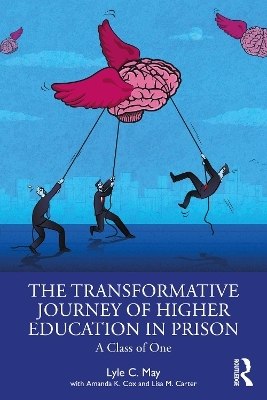
The Transformative Journey of Higher Education in Prison
Routledge (Verlag)
978-1-032-58287-0 (ISBN)
By pairing Lyle May‘s engaging first-person account with current scholarly literature, this book examines the complex relationship between the United States’ educational and penal systems. It also documents the role of education in May’s contributions to society through writing, teaching, and activism. Flouting the stereotype that people sentenced to long prison terms lack an ability or desire for higher education, May’s experience champions individualism as a means of overcoming most environmental challenges to learning, personal growth, and societal involvement. With the right amount of motivation and dedication, even prison walls do not preclude significant contributions to the community or participation in criminal justice reform. Granting access to higher education in places that often lack an academic apparatus, Ohio University’s College Program for the Incarcerated provides an avenue for correctional students to enroll in accredited correspondence courses and earn an Associate or Bachelors of Specialized Studies degree. This book’s recounting of May’s experience with the program augments existing literature on higher education in prison by illustrating the tragic but common pitfall of the school-to-prison pipeline and one man’s determination to pursue higher education despite the hindrances inherent in the prison environment.
Informing both students and educators about aspects of prison life that are not always considered, this book is a valuable component of a well-rounded corrections course reading list. It is essential for educators and students, criminal justice reformers, criminologists, penologists, or any reader intent on understanding how independent learning is critical to unlocking the rehabilitative and reintegrative potential of higher education in prison.
Lyle C. May is an Ohio University alum, member of the Alpha Sigma Lambda Honor Society, incarcerated journalist, advocate for higher education, and activist. He recently published the book Witness: An Insider's Narrative of the Carceral State. Amanda K. Cox is an Associate Professor of Instruction in the Department of Sociology and Anthropology at Ohio University and is an affiliate of the university’s Center for Law, Justice, and Culture. She was a recipient of the Dr. Eric A. Wagner Endowed Professorship and Ohio University Honors Tutorial College Distinguished Mentor Award in 2022. She teaches undergraduate and graduate courses in sociology and criminology, taking a sociological approach to the study of criminological theory, the death penalty, ethics in law and justice, and crime and media. Dr. Cox’s research interests include the death penalty, racial and socioeconomic inequality in punishment, ethics in law and justice, and criminological theory. Her research has been published in several academic journals. Lisa M. Carter is an Associate Professor of Criminology at Florida Southern College. She also teaches courses for the Women and Gender Studies program. She earned her B.A in Sociology from the University of Kentucky, and her M.S. in Corrections and Juvenile Justice Studies from Eastern Kentucky University. She completed her Ph.D. in Criminology at Indiana University of Pennsylvania. Her research interests include female criminality, corrections and rehabilitation, reintegration, and death penalty issues. She is the co-editor of the books, Female Offenders and Reentry: Pathways and Barriers to Returning to Society and Punishing Gender Past and Present: Examining the Criminal Justice System across Gendered Experiences. Dr. Carter co-authored the second edition of The Decision-Making Network. Additionally, she has published in Corrections: Policy, Practice, and Research, Violence and Victims, and Journal of Homosexuality. She holds professional memberships with the Academy of Criminal Justice Sciences, American Society of Criminology, and Southwestern Social Sciences Association. She is a supporter of the Pennsylvania Prison Society and Pace Center for Girls. The Transformative
Acknowledgments
Foreword
PART 1: The School-to-Prison Pipeline
1 Dysfunctional Learning
2 Institutional Learning
3 Class Dismissed
PART 2: Moral Panic: Abandoning the Rehabilitative Ideal
4 Uneducated
5 The Opportunity
6 Returning to the Classroom
PART 3: The Intrinsic Value of Higher Education: Resilience and Resistance
7 Choosing Higher Education
8 Class of One
9 Associate Degree
PART 4: Convict Criminology, Penal Populism, and Why Restoring the Rehabilitative Ideal In Prison Is Not As Simple As the Return of Pell Grant Access
10 Programs
11 Cultural Shift
12 Learning Environment
13 Challenging the Narrative
14 Networking
Epilogue
Afterword
Index
| Erscheinungsdatum | 22.08.2024 |
|---|---|
| Verlagsort | London |
| Sprache | englisch |
| Maße | 152 x 229 mm |
| Gewicht | 267 g |
| Themenwelt | Geisteswissenschaften ► Psychologie ► Allgemeine Psychologie |
| Geisteswissenschaften ► Psychologie ► Pädagogische Psychologie | |
| Recht / Steuern ► Strafrecht ► Kriminologie | |
| Sozialwissenschaften ► Pädagogik ► Erwachsenenbildung | |
| ISBN-10 | 1-032-58287-1 / 1032582871 |
| ISBN-13 | 978-1-032-58287-0 / 9781032582870 |
| Zustand | Neuware |
| Haben Sie eine Frage zum Produkt? |
aus dem Bereich


